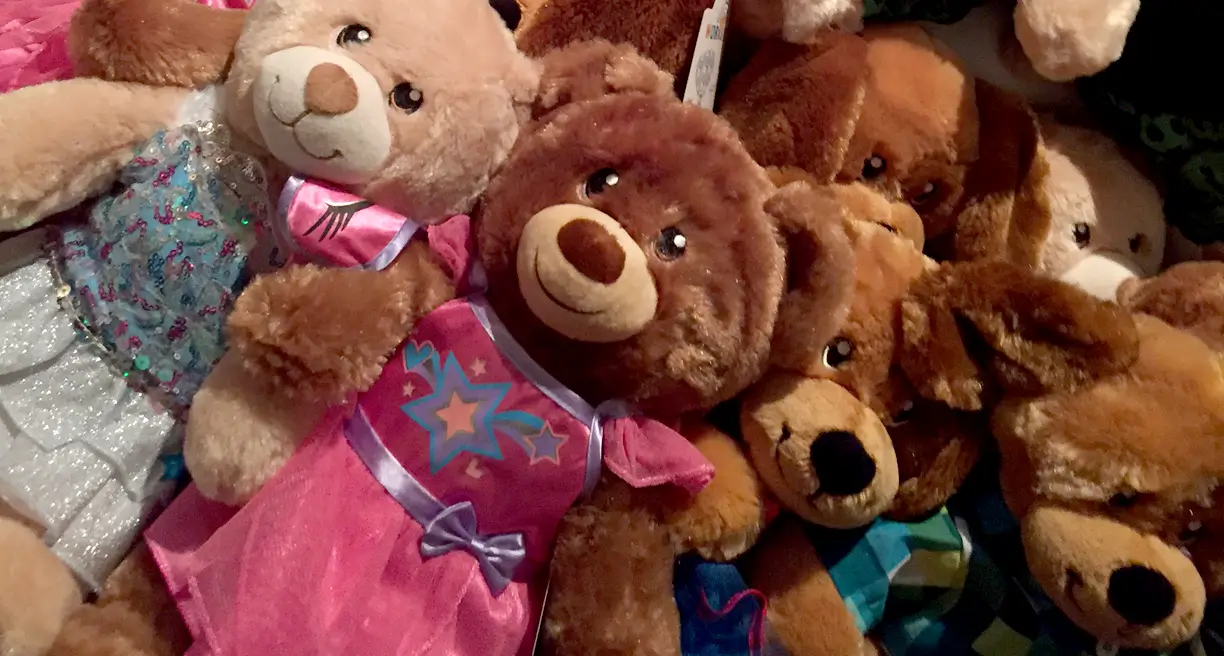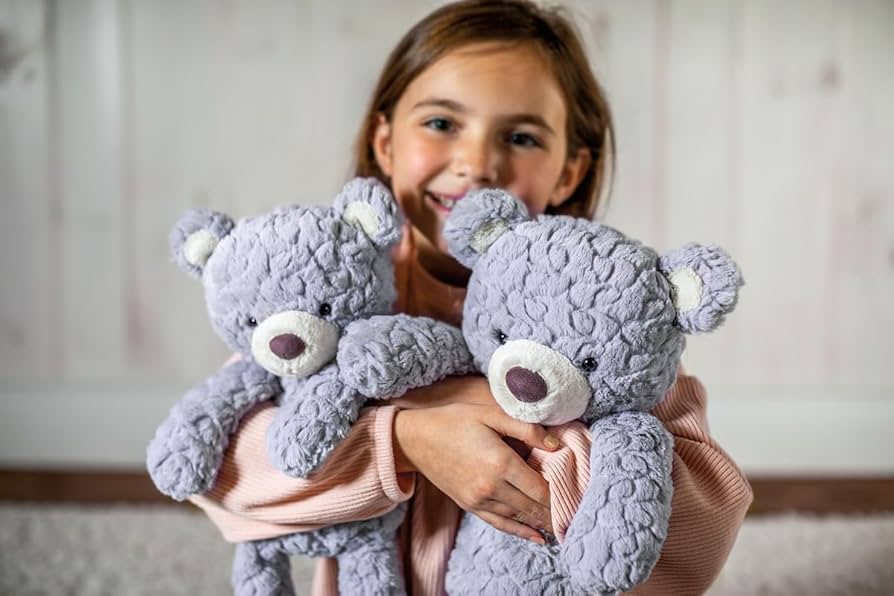blog
How Teddy Bears Help Kids Build Emotional Security
Teddy bears are more than just cuddly toys; they are powerful tools that help children navigate the complex world of emotions. For generations, teddy bears have been beloved companions, offering comfort and security in times of stress or uncertainty. But what is it about these soft, plush animals that make them so effective in helping children develop emotional security? In this article, we will explore the psychological and emotional benefits of teddy bears, examining how they assist children in building emotional resilience, coping with anxiety, and developing healthy attachment behaviors.
Teddy bears are far from ordinary stuffed toys. They play an integral role in a child’s emotional development, particularly in the formative years when children are learning how to process their feelings, deal with separation, and understand their place in the world. Let’s delve deeper into the ways in which teddy bears foster emotional security in children and why they are so effective in doing so.
1. Teddy Bears as Transitional Objects
The concept of transitional objects was introduced by psychoanalyst Donald Winnicott, who theorized that certain objects help children transition from a state of complete dependence on their caregivers to a more independent emotional state. Transitional objects, such as teddy bears, offer comfort and security during times of separation, helping children feel more at ease when their caregivers are not physically present.
A Source of Comfort During Separation
Separation anxiety is a common developmental stage in children, especially when they are first exposed to situations where their primary caregiver is not immediately available, such as starting school, spending time with other caregivers, or sleeping in their own room. During these moments, a teddy bear can act as a surrogate for the caregiver, offering the child a familiar source of comfort. The presence of the teddy bear helps to reassure the child that they are safe and loved, even when their caregiver is not around.
This attachment to a teddy bear serves as a bridge between the child’s dependence on their caregiver and their growing sense of autonomy. Over time, as the child becomes more confident in their ability to manage separation, the teddy bear continues to provide a comforting sense of emotional security.
2. The Role of Teddy Bears in Emotional Regulation
Emotional regulation is the ability to manage and respond to one’s emotional experiences in a healthy and adaptive way. In early childhood, learning to regulate emotions is crucial for mental well-being, and teddy bears play a pivotal role in this developmental process.
Self-Soothing and Stress Reduction
When children experience overwhelming emotions such as fear, sadness, or frustration, they may turn to their teddy bear as a means of self-soothing. Holding, hugging, or cuddling a teddy bear triggers the release of oxytocin, a hormone known for its calming effects. Oxytocin promotes feelings of comfort, trust, and emotional warmth, helping to reduce the child’s stress and anxiety. The simple act of holding a soft, comforting teddy bear can provide the emotional regulation a child needs to calm down and gain control over their emotions.
This self-soothing mechanism becomes particularly useful during moments of emotional distress, such as when a child is upset after a conflict, feeling lonely, or experiencing a difficult transition. By turning to their teddy bear, children learn that they have tools to manage their feelings and find comfort in stressful situations.

3. Developing Empathy and Social Skills Through Teddy Bears
One of the key benefits of teddy bears is that they encourage empathy and social development. As children engage in imaginative play with their teddy bears, they learn to recognize and respond to emotional cues, which is crucial for building social relationships.
Pretend Play and Role-Playing
Pretend play is an important aspect of early childhood development. When children interact with their teddy bears, they often engage in role-playing, taking on the role of a caregiver or friend. This type of imaginative play allows children to practice empathy by “caring” for their teddy bear—feeding it, comforting it, or putting it to bed. Through these actions, children develop an understanding of the needs of others and begin to understand the concept of emotional care.
For example, a child might comfort their teddy bear when it’s “feeling sad,” learning to express compassion and concern for the well-being of others. This practice of caring for their teddy bear helps children develop the emotional skills necessary to nurture relationships with real people, including family members, friends, and peers.
Communication and Expressing Feelings
Teddy bears also serve as a non-judgmental audience for children to express their emotions. Children might talk to their teddy bears about their feelings, frustrations, or joys, using the bear as a sounding board for their thoughts. This helps children develop the ability to articulate their emotions, an important skill for emotional literacy. By talking through their emotions with their teddy bear, children learn that it is okay to express feelings, whether they are happy, sad, or angry, and that these emotions can be managed through communication and self-expression.
4. The Security and Comfort of Routine
Routine plays a vital role in providing emotional security for children, and teddy bears often become an integral part of a child’s daily routine. From bedtime to playtime, the presence of a teddy bear can provide a sense of predictability and stability in the child’s environment, making them feel more secure and grounded.
Bedtime Rituals and the Role of Teddy Bears
One of the most common times when children rely on their teddy bears is during bedtime. Bedtime can be a time of vulnerability for children, as they face the uncertainty of sleep and the potential anxiety that comes with being alone in the dark. A teddy bear offers comfort by providing a familiar presence, allowing the child to feel secure as they fall asleep.
In many households, the bedtime ritual involves tucking the teddy bear into bed, just like the child. This creates a sense of structure and routine that helps the child feel calm and prepared for sleep. The act of holding their teddy bear at night can reduce fear and provide a sense of emotional safety, making bedtime a more positive experience.
5. Teddy Bears and Coping with Change or Loss
Children’s lives are full of changes, and these transitions can sometimes be difficult to navigate. Whether it’s moving to a new home, starting school, or dealing with the loss of a loved one, children may struggle to adjust to the emotional impact of these changes. Teddy bears can offer a sense of continuity and stability during these times of uncertainty.
Comfort in Times of Grief or Loss
When a child experiences grief, whether it’s the death of a pet or a family member, a teddy bear can offer comfort in a difficult time. The teddy bear serves as a constant, familiar object that the child can turn to for emotional support. In some cases, children may even use their teddy bear to express their grief, talking to it about their sadness or feelings of loss.
By providing a safe space for the child to process their emotions, the teddy bear becomes a valuable tool for navigating difficult experiences. It helps the child understand that feelings of loss, while painful, are a normal part of life and that it is okay to seek comfort during these times.
6. The Lifelong Impact of Emotional Security
The emotional security that children develop through their interactions with teddy bears has a long-lasting impact on their well-being. By learning to rely on a comforting object for emotional support, children begin to develop emotional resilience, which is essential for coping with life’s challenges as they grow older.
Building Confidence and Self-Worth
As children develop emotional security through their relationship with teddy bears, they also gain a sense of self-confidence. The comfort provided by their teddy bear helps them feel more in control of their emotions, which in turn fosters a sense of self-worth and autonomy. This emotional foundation enables children to face new challenges with greater confidence, knowing that they have the tools to manage their feelings.
In adulthood, the emotional lessons learned from teddy bears—such as the importance of comfort, self-soothing, and empathy—continue to serve as valuable coping mechanisms. Whether it’s facing stress at work or managing personal relationships, the emotional security that children gain from their teddy bears helps shape their resilience as adults.

7. Teddy Bears as Symbols of Unconditional Love
Perhaps one of the most significant ways that teddy bears help children build emotional security is by symbolizing unconditional love and acceptance. The teddy bear, unlike people, is always there, never judgmental, and always offering comfort. It represents a safe space where children can feel loved and supported, no matter what emotions they may be experiencing.
A Constant Source of Comfort
For children, the teddy bear embodies the concept of unconditional love—the idea that no matter how difficult life gets, they are still loved and valued. The teddy bear is always there to provide reassurance, comfort, and emotional security. This consistent, loving presence helps children develop a sense of trust in the world around them, which is crucial for building secure relationships in the future.
Conclusion
Teddy bears are far more than just stuffed animals—they are powerful tools for helping children develop emotional security. Through their role as transitional objects, emotional regulators, and symbols of unconditional love, teddy bears provide children with the comfort and reassurance they need to navigate the complexities of emotional development. Whether helping children cope with separation anxiety, express their feelings, or deal with loss, teddy bears are steadfast companions that promote emotional well-being.
As children grow, the emotional security gained from their teddy bears becomes an essential part of their resilience and self-confidence. These beloved companions provide a foundation for healthy emotional growth, teaching children that it’s okay to seek comfort and that love and support are always available when needed. The psychological benefits of teddy bears go far beyond childhood—they play a lifelong role in shaping emotional health, helping children become emotionally secure and resilient individuals.

